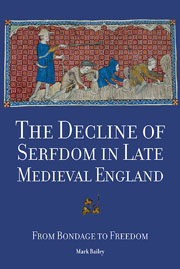Book contents
- Frontmatter
- Contents
- List of Maps
- List of Graphs
- List of Tables
- Acknowledgements
- Abbreviations
- Part I The Decline of Serfdom: Questions and Approaches
- Part II Case Studies
- 5 Reassessing the Decline of Serfdom: Methods and Sources
- 6 Walsham-le-Willows
- 7 Merton College, Oxford
- 8 Aldham
- 9 Tingewick and Upper Heyford
- 10 The Abbot of Bury St Edmunds
- 11 The Dukes of Norfolk
- 12 Miscellaneous manors
- Part III Conclusions
- Appendix: List of original sources used in this study
- Chronology
- Bibliography
- Index
10 - The Abbot of Bury St Edmunds
from Part II - Case Studies
Published online by Cambridge University Press: 05 March 2014
- Frontmatter
- Contents
- List of Maps
- List of Graphs
- List of Tables
- Acknowledgements
- Abbreviations
- Part I The Decline of Serfdom: Questions and Approaches
- Part II Case Studies
- 5 Reassessing the Decline of Serfdom: Methods and Sources
- 6 Walsham-le-Willows
- 7 Merton College, Oxford
- 8 Aldham
- 9 Tingewick and Upper Heyford
- 10 The Abbot of Bury St Edmunds
- 11 The Dukes of Norfolk
- 12 Miscellaneous manors
- Part III Conclusions
- Appendix: List of original sources used in this study
- Chronology
- Bibliography
- Index
Summary
The abbey of Bury St Edmunds was one of the wealthiest and most renowned Benedictine monasteries in medieval England. Its extensive estates were scattered across East Anglia, but were mainly concentrated around the abbey in west Suffolk, where it also enjoyed additional judicial powers through the Liberty of St Edmund. Its landed endowment was internally subdivided between each of the abbey's main obedientaries, who ran their allotted manors independently. The abbey of Bury St Edmunds is often depicted as a highly conservative landlord, whose relationship with its tenants was characterized by recurrent conflict. Certainly, the strong presence of villeinage on its manors contrasted starkly with its relative absence, and the high levels of freedom, throughout most of East Anglia. This case study focuses upon two large manors, Chevington (Suffolk) and Fornham All Saints (Suffolk), with a high proportion of customary land. Both formed part of the internal estate of the abbot himself, which comprised around a dozen demesne manors, and both were situated close to Bury itself. Thus they provide an opportunity to observe the management of serfdom on two classic manors held by a powerful and conservative lord.
Chevington
Customary land tenures
In the 1270s the manor of Chevington comprised around 340 (arable) acres of villein land, nearly 450 acres of free land, and 460 acres of demesne arable.
- Type
- Chapter
- Information
- The Decline of Serfdom in Late Medieval EnglandFrom Bondage to Freedom, pp. 169 - 197Publisher: Boydell & BrewerPrint publication year: 2014



